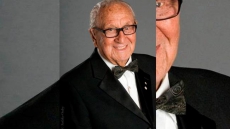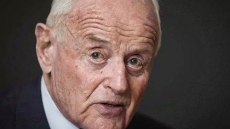WINNIPEG — Rana Bokhari was barely out of law school and had just been called to the bar in 2013 when she became leader of the floundering Manitoba Liberal party.
She inherited a party deeply divided and with only one seat.
Very little was known about her other than her promise to focus on rebuilding the party's coffers and selling new memberships.
Three years later, without a seat in the legislature, the 38-year-old remains a bit of an enigma.
"I am very aware I'm the newbie in town," Bokhari said in a recent interview. "Everyone has to start somewhere. No one is just waking up as a premier."
Bokhari was born one of five children in Anola, Man., after her parents immigrated from Pakistan. They ran a poultry farm and were the "only brown family" in the area, she recalls.
While she helped on the farm, the expectation was for her to have a career — either a doctor, a lawyer or an engineer.
"People always ask me: You're not married and you don't have kids — blame my parents," Bokhari laughs. "They really wanted us to be self-sufficient, independent, strong, dedicated, competent working women."
After graduating from high school in 1995, Bokhari worked at a grocery store chain and two women's clothing outlets. The family had to leave the farm in 2000 for reasons she won't talk about.
The family went to Pakistan for what was supposed to be a quick "re-group," but stayed there for four years.
Her father had a major stroke during a family meal. They had to travel four hours to get him to a hospital.
"It was one of the worst memories of my life," says Bokhari, who still lives with her parents. "People don't understand how desperately grateful I feel every single day. I'm very aware of what my life could have been."
While her father slowly recovered, the family struggled to make ends meet in Pakistan. She sewed, bartering clothes for more material. Eventually, the family came back to Canada and Bokhari attended the University of Manitoba.
After three tries, she got into law school and graduated in 2012 — a year before becoming leader of the Liberal party. She became a junior lawyer at Carroll Law Office and continued to work there for a time after becoming leader.

Bokhari has faced questions about the time after the law firm's partner was ordered by a Manitoba judge to void "unconscionable" extra fees charged to residential school survivors. The charges were through a form-filling company co-owned by Ken Carroll and Bokhari's brother.
The Liberal leader says she never worked for the form-filling company and there is no evidence she was involved in billing. No action has been taken by the Manitoba Law Society, which Bokhari points out would have happened had she done anything wrong.
"(It) would have had me snapped in place within 45 seconds of this whole thing coming out."
She has been criticized for sidelining the party's lone MLA and former leader, Jon Gerrard, as well as for waiting 24 hours before dropping a candidate who was criticized for social media posts referring to women as "whores" and "skanks."
Just a few weeks ago, her chief of staff and his girlfriend, who had been nominated as a candidate, resigned without explanation.
Bokhari has a tough campaign ahead of her. She is fighting for a seat in the Winnipeg constituency of Fort Rouge against popular writer and broadcaster Wab Kinew. He's running for the NDP and Audrey Gordon is carrying the banner for the Progressive Conservatives.
"I almost feel like people want to see if they can break me. What they don't realize is criticisms are not going to break me. Twitter trolls are not going to break me.
"If I was going to be broken, it would have happened that first year (as leader) when I was really by myself and was being attacked ... when I was just trying to rebuild the party."
A self-described non-ideologue, she has made a series of boutique policy announcements ahead of the April 19 election: privatizing liquor stores, removing the sales tax on haircuts over $50 and opening the province to ride-hailing services.
Kelly Saunders, a political science professor at Brandon University, says the public still doesn't have a sense of who Bokhari is or what her party stands for.
She has failed to capitalize at a time when people seem deeply disaffected with the status quo, Saunders says.
"She doesn't really seem to be very comfortable in day-to-day politics, whether that's mobilizing supporters or talking to the media or even working with her candidates."
Bokhari says she has "zero doubt" in her ability to lead the province.
"If I can walk out of this with my integrity intact, without having (been) thrown into the mud-slinging ... I'll call that my success."





